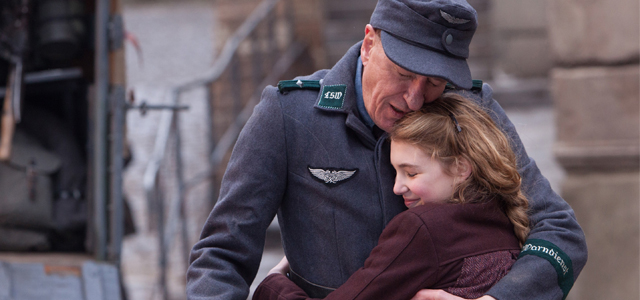(PG) Sophie Nélisse, Geoffrey Rush, Emily Watson, Nico Liersch, Ben Schentzer
The Book Thief is a World War II film with a difference. It is a home front story set in Germany, telling the stories of the ordinary German people who had their country taken hostage by the Nazis.
The film centres on nine-year-old Leisel Meminger. With an absent father, a mother who has been sent to a concentration camp for alleged Communists, and a deceased brother, she is adopted by Hans and Rosa Huberman. Teased at school for being illiterate, she starts learning to read with the help of Hans. At a Nazi book burning rally she steals away with a copy of HG Wells’ The Invisible Man and soon develops a passion for reading.
In theory The Book Thief is a story of young people caught up in the horrors of Nazi Germany, but due to its point of view those horrors are largely absent from the film – this is a very PG treatment of World War II. That we see the world from the eyes of this young girl means that the scope of the film rarely extends beyond her immediate experience. So for the majority of the film there is no direct experience of combat, and while the Hubermans harbour a young Jewish man, it is never made explicit what they are hiding him from. As such, the film is very dependent on required knowledge to understand the stakes. Interestingly though, the most traumatic scenes in the film are those in which we see men and boys being conscripted into the Nazi army. For this young girl, largely unaware of the happenings of war, the most immediate effect of the war is watching friends and neighbours being taken away to serve.
Based on the bestselling novel by Australian author Markus Zusak, The Book Thief is an example of why complete reverence to the source material should not always be the ultimate goal of a film adaptation. Like Zusak’s novel, the film is narrated by death, voiced by British character actor Roger Allam. While by all reports this device works in the novel, on screen it feels horribly gimmicky. Naff gimmick aside, it also simply isn’t good narration. The narrator has no consistent, meaningful presence. Instead the narration tops and tails the film, only appearing at a few moments throughout for unnecessary exposition. Simply removing the narration would have immediately improved the film, even if it meant being slightly less true to Zusak’s novel. Unfortunately though, the films narration is just one element of a poorly written, sappy and cliché ridden screenplay, ironic given the film is all about the power and importance of the written word – “words are life” Max declares.
The film also takes an off-puttingly inconsistent approach to language. The film is set in Germany with all characters speaking English with German accents. This is a common device that allows an English speaking audience to understand what is being said while still maintaining the illusion that everything is happening in German. Except in The Book Thief there are also some moments where people speak in German with subtitles. The written word is such a prominent part of this narrative and similarly there is a mixture of words written in English and words written in German. This is not a major issue, but to those who notice it is an odd and unnecessary inconsistency.
Geoffrey Rush and Emily Watson put in lovely performances as Liesel’s adoptive parents, and young Sophie Nélisse with her large expressive eyes is quite good as the film’s central character, but they alone cannot compensate for this film’s problems. The Book Thief may resonate with a younger audience but more mature viewers may become frustrated with its willingness to resort to cliché and its simplistic approach to a moment in history which, even given the films point of view, requires a more complex treatment.
Duncan McLean













